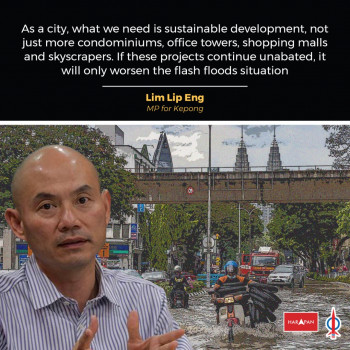By Cindi Loo

How many young people never got the chance to take up a career in the corporate world, for example, because they simply didn’t ‘speak good English’? When did language become the be-all and end-all of job opportunities? What about attitude, creativity, tenacity, enthusiasm?
Sometimes, we forget that education, and language, are not black-or-white issues. There are a lot of shades in between, and the conversation of things like creativity, expressiveness and personality often get lost in our debate of ‘declining English standards’ or ‘mother-tongue education.’
I witnessed this first-hand recently with a mobile store salesman.
I had just given up on dealing with my telecommunication service provider for a new phone and mobile data plan, when I saw a promotional ‘bundle’ which the shop (where the salesman worked) was offering. I then walked into the shop to enquire about it.
I started my conversation in English, which he replied also in English.
However, after a while, either he could sense that I can speak Mandarin, or he just couldn’t keep up with the English anymore, so he switched to speaking to me in Mandarin.
As it turned out, I had a really enlightening conversation with him.
Being the picky customer that I am, I continued to challenge him to give me the best services that my money could buy, and with every challenge he accepted it with grace, politeness and an enthusiasm that any salesman should aspire to have.
What struck me was that he didn’t find my preference for a default setting in English elitist or arrogant, despite me being completely capable of understanding both; he in fact said he would do the same as well.
“I know I don’t look like it, that I’m really bad at speaking English, but I also prefer to have English as the default language on my phone,” he said, to my surprise. It was also further proven when I later saw his iPhone 6, which was really set in English.
Later, when my friend came to meet me at the shop, he tried his very best to entertain her inquiries about phones and various accessories in his broken English, and she also tried to understand some of his explanations in Mandarin, although she does not speak it well.
Amidst all this talk of ‘world-class’ education and employability, I feel like there is a gap in the conversation somehow.
Here I see a bright young man, probably my age, who is enthusiastic, charming, down-to-earth and striving his best to give a satisfactory service to his highly demanding customer. He took it really well, and while many experienced salespeople may have been very irked by such a customer, I walked out of the shop happy with my purchase.
With enough training and opportunities, who knows? He may have charmed CEOs by proposing mega projects or become a diplomat by utilising his oratory skills for greater purposes, but for now, he’s only at this little phone shop doing what he can to boost the sales in the store.
I wonder: did the salesman lose out on a lot of job opportunities simply because an employment agency deemed him not good enough to place in executive positions, because his English isn’t “up to par”?
Did his poor command of English suddenly become a generalising statement for all young men like him, who were not given a chance in the first place?
I find that notion really sad. I understand that English is very important, but I also think that our slanted education policies have made plenty of good people, young talents also, to fall through the cracks, only being “mediocre”, never being “great” because they didn’t speak the Queen’s English.
It’s the same sadness (and awe) I find when once, as I was interviewing a burger seller and he was able to cook up amazing gourmet burgers simply from previous training at similar burger joints. He was ever the charming salesman, speaking really good English and with wide knowledge in politics and current affairs.
You wouldn’t think he quit school at 15! But quit he did, and he wouldn’t be able to have any career advancements in a job market that pays far too much attention to a piece of embossed paper.
I’m starting to think that matters like employment and education aren’t as black-and-white as the politicians made it out to be, or how the public ‘outrage’ of Malaysians define it to be.
Sometimes that indignation borders almost on discriminatory, as ‘experts’ recount ‘horror’ stories about the appalling standard of our English; that ‘stringing a simple sentence’ is what it takes for an undergraduate to get a job; barring the fact that everything else – enthusiasm, passion, creativity – is left out of the equation.
I really hope for a day when our bright stars, regardless of the kind of education they received, could be given a chance to take a stab at the world if they so want to, without being defined by language requirements or academic qualifications. – The Rocket
Cindi Loo is a former journalist.



